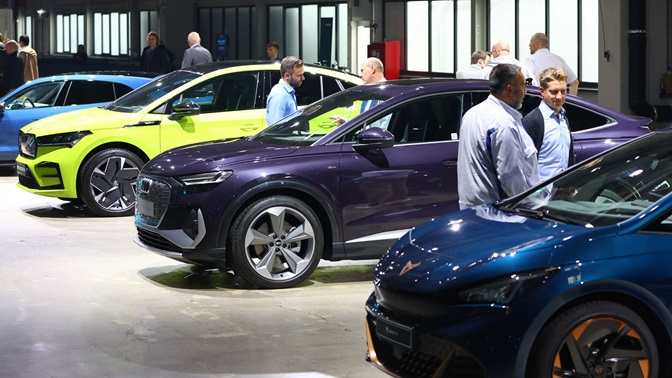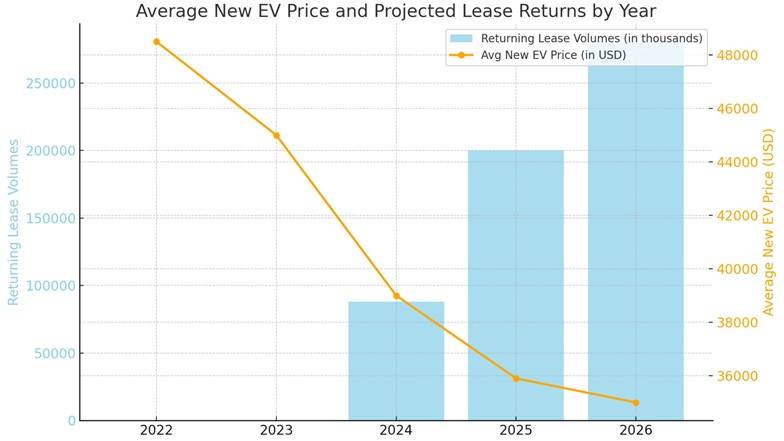As the electric vehicle (EV) market matures in the U.S., we’re entering an exciting phase for both new and used EV buyers. According to J.D. Power, over a quarter of a million EV leases will end by the end of 2026, bringing a flood of gently-used EVs into the market at potentially lower prices. For anyone looking to go electric on a budget, this influx could mean substantial savings and greater availability of EV options.
Here’s a closer look at what this wave of lease returns means for potential EV buyers, why current lessees may decide to lease again rather than buy their used EV, and how falling new EV prices are transforming the market.

The Big EV Lease Return
- Flood of Used EVs by 2026: With over 250,000 leases ending, the used EV market is about to get a major boost. This could mean better prices and more options for consumers interested in going electric without the high cost of a brand-new vehicle.
- Declining EV Prices: The average price of a new EV has dropped from $48,500 in 2022 to $35,900, thanks to new incentives and increased competition among automakers.
- New EV Leasing Advantage: Many lessees might choose to start a new lease instead of buying out their current EV lease, as leasing costs for new models can be more affordable.
Why This Could Be Great News for EV Buyers
As EV technology improves, more models are coming onto the market, creating both excitement and more affordability. With several automakers—from General Motors to Hyundai, Kia, and BMW—rolling out a broader variety of EVs, the market is becoming increasingly accessible. General Motors, for example, already offers nine EV models, with more in the pipeline. This boom in model diversity, coupled with automakers’ desire to meet varying consumer needs, is contributing to the decline in both new and used EV prices.
New EV vs. Used EV Costs
| Feature | New EV (Compact SUV) | Used EV (Compact SUV) |
|---|---|---|
| Monthly Lease Payment | $457 | $477 (if buying out lease) |
| Average Price | $35,900 (with incentives) | ~$29,645 (residual value) |
| Eligibility for Tax Credit | Yes (depending on model) | No, if priced above $25,000 |
As we can see, the cost of leasing a new EV often makes more financial sense than buying out an older lease, especially as new EV prices continue to fall. Without the used EV tax credit (only available on vehicles under $25,000), leasing a new model seems more appealing to lessees.
The Appeal of Leasing New EVs Over Buying Used
For current EV lessees, leasing another new EV may make more sense than buying out their current one. Let’s break down why:
- Monthly Lease Payments Are Often Lower: The average new EV lease payment for a compact SUV is now around $457 per month, which is more affordable than the $477 per month payment for buying out the same car at the end of its lease. In the current market, sticking with a new lease seems like a smarter financial move.
- Improved Technology and Efficiency: New EV models are consistently upgraded with better range, tech features, and safety enhancements, offering lessees a better experience with each iteration.
- Potential EV Incentives and Tax Credits: New EV leases often benefit from tax credits and incentives that reduce upfront and monthly costs, making a fresh lease attractive. With used EVs, especially those priced over $25,000, these financial perks are largely out of reach.

Here’s a graph illustrating the trends in average new EV prices and projected lease return volumes from 2022 to 2026. The blue bars represent the anticipated volume of returning EV leases (in thousands), while the orange line shows the average price of a new EV in USD. This visual demonstrates the expected increase in returning EV leases alongside the gradual decline in new EV prices, highlighting an evolving market landscape likely to benefit those interested in affordable electric vehicles.
Declining New EV Prices Drive the Market
Thanks to increased EV production and competition among automakers, EV prices are projected to continue falling. In 2022, the average price of a new EV was $48,500. Now, that price has dropped significantly to an average of $35,900, including incentives. This trend is a relief to those who might have been put off by high EV prices in the past.
Consider the New EV Market Shift: Automakers are responding to the push for affordability with new, lower-cost models, and industry reports show 94% of EV owners are likely to stick with electric for their next vehicle. If this enthusiasm continues, more consumers will be turning in their leases for the latest models, creating even more opportunities in the used market.
Future of EV Incentives and Tax Credits: Uncertain Times Ahead?
One major factor to consider is the future of tax credits and incentives for EVs. Currently, federal and state incentives make EV leasing and purchasing more affordable, but there’s no guarantee these benefits will remain the same in the future. If tax credits are discontinued or significantly reduced, it could reshape the market yet again, potentially affecting lease prices, new EV costs, and residual values for used EVs.
While today’s prices reflect generous incentives, buyers need to keep an eye on policy changes that could impact the affordability of new and used EVs down the line.
Is Now the Right Time to Lease or Buy a Used EV?
The influx of used EVs expected by 2026 and the continuous release of new, more affordable models make this an exciting time to consider going electric. For those interested in a used EV, the approaching wave of lease returns will bring a variety of options to the market at attractive prices. However, new EV lessees may find that renewing their lease provides them with the latest technology, performance, and financial perks.
- New EV leases are getting cheaper as automakers increase model offerings, creating competitive pricing.
- The used EV market will surge by 2026, offering affordable options for budget-conscious consumers.
- Incentives and tax credits are crucial in making EVs affordable, but their future is uncertain.
With both lease and purchase options becoming more accessible, the next few years are promising for prospective EV owners. Keep an eye on incentives, price drops, and incoming models to make the best decision for your budget and lifestyle. Whether you’re a first-time EV buyer or a current lessee, the market has never offered more choices or better deals.
Related Post
